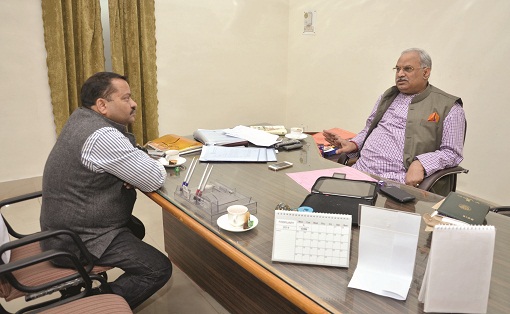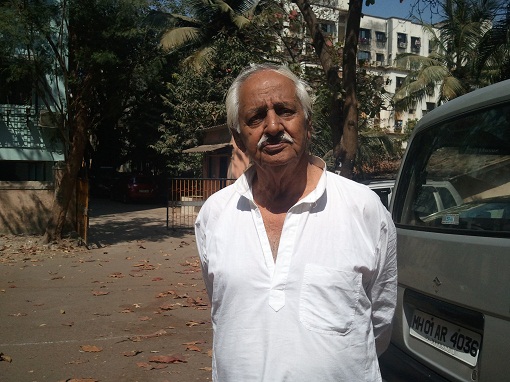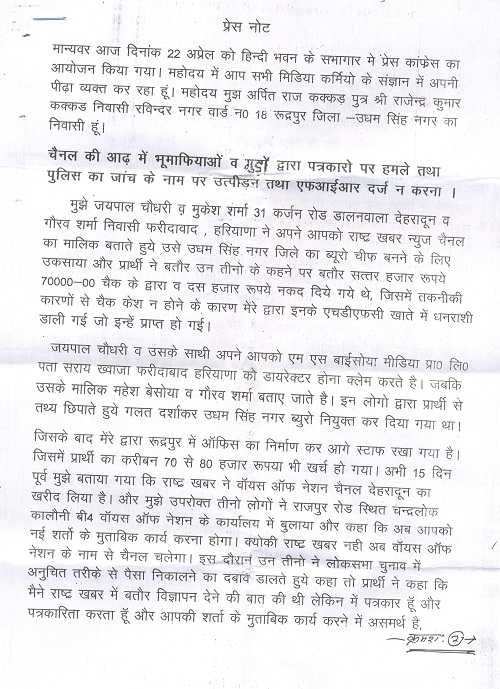For any industry to thrive in a new territory all it requires is ample natural resources, favourable (read gullible) human capital, a couple of cloud representatives and inefficient/gratified /negligent policy makers and certain quarters of blindfolded regulators and 'knowledge sharing consultants' who act as 'Sanjays' (fund-raising agencies and advisors) for 'Dhratrashtras' i.e. the myopic policy makers. This recipe is wonderfully available in all the newly formed states like Uttarakhand.
Not that, these states were not having these elements when they were part of their parent states, but these elements were out-casted in any role. The centralized authoritarians kept entire moral responsibility of an inclusive growth and development on a back-burner and had to face the wrath of woken-up citizens who carved these respective states. However, the new 'stake-holders' did exactly the opposite of what it was expected out of them. They took the values and faith of the citizens for a ride and continued the same spree with a localized face. The dream of a livable social fabric of inclusive sustainable growth was again missing with the fiefdoms being localized and obliging a handful of 'relationships'.
I would restrict myself to Uttarakhand, since, it would be inept for me, if I present obfuscated observations/feelings and prevalent scenario of a place that I have never personally visited. I still call Uttarakhand a new state, since it takes generations for a new state to come out of the 'turnkey project cycle' and run on its own in any standard and/or adverse conditions like any other 'old/established state', per say, at the national/international standards.
When I was a school boy, during my daily regimen of morning exercises, I used to find heaps of spent chemical and chemically treated process waste thrown around the country-side every night and left for the environment (air, water, soil and humans) to consume it in its natural course of time and process. The situation after 20 years is still the same, but yes the process has taken a dramatic change. India Inc. has become more intellectual, elegant and environmentally cautious, they no more discard it so outrageously, due to a paradigm shift termed as 'technical collaboration' or 'joint venture' to absorb the collateral damage and facilitate mutual 'business oriented issues'.
Based on the regional resource dynamics of Uttarakhand, manufacturing sector and stone crushing sector has witnessed exponential growth without conceding to and brazenly flouting all the global environmental norms and benchmarks as a result of the coterie formulated due to the relevant aspects that I mentioned in the first Para. Pollution control regulatory bodies have set-up specific and collective guidelines for industrial development which aims at abetting pollution at the onset of the process. Why I am referring Uttarakhand as the new Africa for India Inc., is that despite understanding and following the same guidelines in other parts of the country and globe, India Inc has forgot them in Uttarakhand or has been able to hold on ransom, the state government and authorities on meager development and marginal employment related issues.
The issue of setting up one and the only ambient air monitoring station in the state, that too at 'Clock Tower' Dehradun a residential/commercial area puts a serious question mark on the 'expert' capabilities of UEPPCB. As per the data on the website of UEPPCB (Uttarakhand Environment Protection and Pollution Control Board) the ambient air quality has gradually been deteriorating in last 5-7 years and still the board doesn't finds it necessary that ambient air monitoring stations be erected across the state in all industrial estates, commercial/residential localities and projected industrial hubs to take control of the situation. The matter of a CHWTSDF (Common Hazardous Waste Treatment Storage and Disposal Facility) that has been planned for just 5 years also needs to be reviewed since the amount of waste generation will increase in times to come and probably one facility for each region, Kumaun and Garhwal, will have to be established. The SPCB (State Pollution Control Board) will have to acquire ample resources, knowledge and expertise of checking the quantum of Hazardous Industrial Waste being generated in the state as well as the stored/dumped waste since ages, which also needs to be shifted to a secured CHWTSDF. At no account we can await a human induced natural tragedy that would be irrevocable. One pertinent observation which also arises is, that why was not a waste management policy adopted and setup prior to the formation of dedicated Industrial Estates/Zones in the state and at what speed is the board and the govt updating itself to give 'Devbhoomi' a clean industrial development. The SPCB will have to come out of its slumber and update itself with the new technologies and processes at an unprecedented speed, since, to my understanding a considerable irreversible damage has already been done to the environment in Uttarakhand.
If a recent article in a national daily (Kumaun edition) is to be accepted, that the excavated grounds by stone crushers (in their facility and around the river-beds) are being filled with the spent chemical and process waste from the local Pulp & Paper Mill, than the process of ground water table contamination has already been accelerated by this 'Joint Venture Collaboration'. There is a need to check it as soon as possible, since the matter is of pertinent importance taking into consideration the natural run-off and flow of ground water table from the high-lands to the foothills and terai region. An immediate investigation and base-line survey needs to be conducted across the foothills and terai region with Ambient Air Monitoring, Ground & Run-off Water and Soil sampling in and around the pockets of these industries. Similar, instance has already occurred in the Nangal area of Punjab wherein ground water table was drastically contaminated by a pharmaceutical company and was forcibly shut down by the government. The case is still subjudice in the High Court of Punjab, wherein the industry has filed insolvency and pleads that it does not have enough resources to resolve the issue and till date abnormal quantities of incinerable and hazardous waste still stands lying in the company premises. It is to be brought to the knowledge that to de-contaminate that one pocket of ground water table money will be spent from the tax-payer's pockets.
The amount of negligent planning is still on large. Recently, Municipal Corporation of Haldwani (Distt Nainital) has proposed a MSW (Municipal Solid Waste) Project citing 60-70 TPD (Tonnes Per Day) of waste generation. The area earmarked as 'dumping ground' by the planners and 'so called' consultants is near the river-bed of river 'Gaula', a natural rain-fed water-body flowing from North to South with Kathgodam-Haldwani-Lalkuan-Pantnagar on its Western side and Golapar-Chorgalia on its Eastern side.
The situation and casual planning procedures are alarming and also put a question-mark on the 'technical knowledge' of the 'SNA' adopted by JNNURM Nodal Office at Dehradun/Delhi. Taking this aspect into consideration it is pathetic to be played down by the entire coterie to plan a 'dumping ground' for serious municipal waste project near a river bed. Leaching of chemical and biological contaminants and gradual percolation would contaminate the ground water table at an alarming pace near the river-bed, than any other place. Even if a SLF (Sanitary/Secured Landfill) is being planned, how is an area of mere 4 acres going to survive the quantum of waste that will be generated by the gradual influx of population due to industrial development in the general area needs to be seriously debated. At the same time the SLF would be vulnerable near a water body due to any hydrological pressure buildup beneath the landfill/HDPE Liner which may be ruptured/leaked. In any case, no company/consultant till date confirms a non-percolating landfill, it is stated that the process can be delayed 'only' by 'expert and effective operations', which needs to be investigated in detail about the SLFs operating till now in the country. It is surely doomed to be a 'White Elephant' with money being shared across the tables and a lip-service being done to the cause. Worst would be the scenario since the flow of the water is going to contaminate consumable water in the down-stream region i.e. Haldwani to Lalkuan, where, the water would combine with the chemical dumping grounds of the Paper Mill under the stone crushers. Needless to say that the proximity of a stone-crusher to the river is essential to achieve business economics and that it is the sole reason stone crushers are thriving in the proximity of river Gaula, flouting all environmental norms applicable to a critically polluting industrial unit, whether it be proximity to population & reserved forest areas (3-5 kms), controlled excavation, transport of raw & finished material, crushing processes, SPM levels, quality management systems, health hazards, illegal stocking on agricultural land and highways, emergency response planning and proximity to populated/inhabited areas.
As part of the Detailed Project Report (DPR), 'Consent to Establish' and 'Consent to Operate' extended by the regulatory body (SPCB) any industrial unit has to comply with Air, Water & Soil Protection Act and Public Liability Insurance Act. One crucial aspect of the industry before establishing and operating is to take care of the 'Carbon Foot-print' and to take ample procedures as per the expected Carbon Foot-print in the years to come, for an effective abettment of pollution. The global policy on the aspect is also the same – 'Polluter Pays'. Today if we go across the Industrial Areas and Stone crushers, the situation is pathetic, there is no or negligible Green-belt developed by the industries, even to the matter that being a government regulatory body SIDCUL has not been able to put up a respectable show that should be an example for the industries and accordingly be regulated on the ground. Green-belt does not, at all mean, a lavish garden with some ornamental greenery inside the factory compound, but a pre-designated percentage of the total land of the factory with a combination of high-rise trees, thick cover, absorbing the fugitive emissions & VOCs, sound and visual pollution; medicinal trees in the free-zone and lastly the ornamental thick shrubs on the inner side. Some 'enterprising' industrial units/brands, though have tried to do a lip-service to the issue but they need to pull-up their socks, since saplings planted on the periphery cannot sustain the weather conditions. A fully grown, matured plant with adequate care over a period of time can only achieve the aim of rendering an effective Carbon Free sustainable environment along-with other efficient energy, water and waste management clean-technologies which reduce the collective Carbon Foot Print of existing and proposed industrial areas in the state.
SIDCUL needs to look into the matter with great responsibility, since matters related to sustainable development and visual appearance of the Industrial Area is its prime responsibility. Present situation of the industrial area does not prove the point that we are a state that boasts of 60% forest cover of the total land area of the state. SIDCUL needs to take control of its civil contractors to adhere to the latest environmental technologies and processes to abet serious health and accident hazards when construction being conducted in the area is devoid of any sense of environmental responsibility, health & safety consciousness. The drastically rising air pollution and SPM level across the 'Tri-city Area' of Haldwani-Rudrapur-Kashipur is alarming. It is not far that we are going to hear cases of severe health ailments which have mired the states like Punjab with un-regulated industrial development. The Air will not be conducive for a healthy living and may lead to serious respiratory problems in infants and younger generation.
Though the situation is critical, but can still be controlled, only if a dedicated, visionary and combined effort is actuated by the Hon'ble High Court (being the appellate body for pollution abetment) and direct SPCB, SIDCUL and MoEF to take corrective actions at the earliest to 'promise' a clean state to our future generations. Apart from this, Dept. of Industrial Policy & Planning also needs to establish an 'Audit Body' that keeps a check on the defaulting units and take serious policy related actions against the culprit states and its pollution control boards. IIT Delhi on the request of CPCB had conducted an inclusive report (CEPI, Comprehensive Environmental Pollution Index) and indexed the comprehensive environmental pollution in all industrially active states and punitive actions were justified and further developmental aid and projects were discontinued until the states took considerable actions on ground to curb the social menace of polluting the environment. The report may be referred by the appellate body to carve the environmental future of the state. At the other hand, SPCB has to intake more professionals committed to the cause with latest knowledge and skill sets, since the matter cannot be addressed as per global standards with the present manpower and unqualified members on 'ad-hoc' basis to manage the show. The ratio of present, expected and proposed industries vis-a-vis suitable manpower has to be calculated and addressed by the SPCB at the earliest, lest we are ready to create another Punjab out of a beautiful state like Uttarakhand.
Another visionary step that the state government needs to initiate is that a thorough industrial planning be conducted in respect to the National Manufacturing Policy which may guide us to a clean and sustainable development of the state. Only Green and Orange category industry may be allowed in the state which does not blatantly mis-utilize natural resources like water in the manufacturing process. As it is, we are not a state that has got ample water resources and if we are to take into consideration the latest global reports and strategic occurrences, then the final war is going to be on Water rather than Oil. Alternately the state within one year may be developed into the next IT, Tourism, Food Processing and related Educational hub if the process is put on full throttle with a 'time-line'. Why I am emphasizing on 'Timeline' is that the issue of govt. projects gets shot down by the ineffective state machinery, which due to its negligent work attitude coupled with the bureaucratic processes, delay the time-line thereby escalating the carbon foot print of a project.
We still have got some time to infuse collective efforts towards a sustainable development by effective inclusion of Alternate Energy Resources and Clean-technologies while setting up the long term goals for the state. This requires an inclusive approach from the regulatory bodies by including professionals and advisors carrying requisite exposure, experience and knowledge base in various clean-tech applications and its integration to create a road-map for futuristic cities in the state. The SPCB unlike any other state regulatory body should be given a target to achieve with clear deadlines along-with 'teeth' to 'bite', rather than produce a meek smile every time in front of any corporate giant and/or a JV nexus.
The recent environmental clearance for POSCO (to establish steel plant in Odisha) being revoked by the Green Tribual is an example that we need tougher laws for companies to adhere to the environmental responsibilities, lest we intend to leave a doomed planet for our children. However, the worry is not a POSCO which is yet to establish the factory, but end number of 'Poscos' which already exist and take serious environmental issues for granted. The informed and updated MoEF – Jairam Ramesh had the vision to look ahead in the future and accordingly was devising and implementing essential guidelines to safeguard the environment from further deterioration. To fall in line, the present MoEF – Jayanti Natrajan, has sooner or later understood the gravity of the situation and has pitched for 'harsh penalties' including imprisonment for violations of environmental norms by the India Inc. and closure notices for defaulting units. At the same time, Ms. Natarajan also needs to come out of the grid of being a 'party spokesperson' and 'media representative' and get cracking on ground to her clear and present responsibility, as it has been quite a while that she has taken up the office and now can't offload each crucial issue on her predecessor. Although 'action' requires conviction with a moral courage of steel irrespective to party politics, FDIs and Technological Collaborations.
While concluding, I would again reiterate that, the factor of industrial development and related environmental reforms for Uttarakhand, today stands at a paramount importance due to the geographical, demographical and development needs which are complex and specific to the region and therefore need to be addressed with a specialist method rather than applying a

Capt. Mohit Joshi
-Capt. Mohit Joshi





